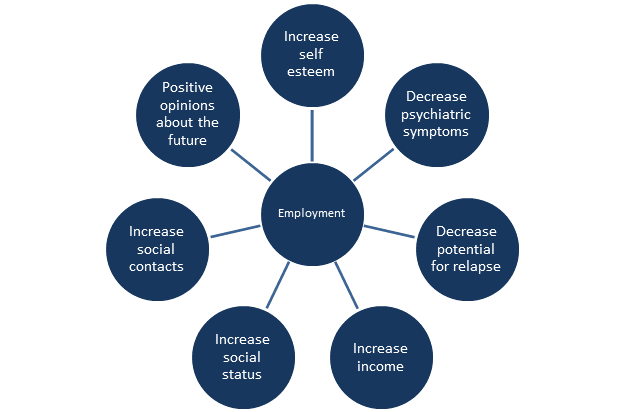The Power of Employment
Poverty and dependency are two of the most important barriers to psychiatric rehabilitation, recovery and wellness. Our conversations with thousands of people in recovery have shown us that most of them have a strong desire to work, earn higher income, gain control over their personal finances, build assets, and achieve greater levels of self-sufficiency.
Employment can change an individual’s life. People who are employed are far less likely to visit the ER and often see a decrease in their psychiatric symptoms.
Employment means:
Having control over one’s financial life: Economic self-sufficiency means that individuals can make decisions about their own goals and day-to-day finances. Although at times helpful to individuals, some circumstances that do not allow individuals to have control over their own financial life include:
- having a representative payee who has authority to receive or cash checks and make financial decisions for individuals;
- guardianship, in which another makes not only economic decisions but also decisions in other areas of the person’s life; and
- having a trustee who administers a special needs trust fund to ensure money is utilized for a specific purpose, often not determined by the beneficiary.
Having independence from public programs: Programs that provide public assistance, benefits and entitlements, such as Supplemental Security Income (SSI), Social Security Disability Insurance (SSDI), Food Stamps, and Temporary Assistance for Needy Families (TANF) provide critical short- or long-term assistance to individuals unable to financially support themselves. However, these programs also place restrictions on the level of earned income and assets of individuals and require that individuals remain in poverty. These programs also limit the choices individuals have. For instance, a person receiving food stamps may only purchase food in establishments that take food stamps. Similarly, depending on Section 8 or public assistance for housing limits a person’s residential options.
Having sufficient earned income: Income poverty is an important barrier to recovery and overall wellness as it limits individuals’ access to adequate nutrition, safe housing, reliable transportation, and quality healthcare. Having sufficient income means having enough financial resources to afford not only essential living expenses, but also to decrease or eliminate debts and liabilities, and increase assets through building savings.
Having assets: Poverty not only means lack of sufficient income but also lack of enough assets to be self-sufficient. Actually, it is assets and not income that determine the wealth and financial independence of an individual. For instance, an individual who has savings or property and loses steady income still has the ability to be self-sufficient. Alternatively, an individual with debts greater than his/her assets is less self-sufficient and at higher financial risk.
“Work is extremely important both in maintaining mental health and in promoting the recovery of those who have experienced mental health problems.” (Rinaldi &Perkins, 2000)
“The good news is that economic empowerment interventions, such as those that help individuals and families to build assets (e.g., save to purchase a home, pursue postsecondary education, start a business, and retire) can improve the economic security of vulnerable populations and these interventions can help people with psychiatric disabilities achieve their recovery goals and economic integration.” (Sherraden, 2008)
Adapted from
Taken from the “We Can Save” consumer and provider curricula developed by the New York Association of Psychiatric Rehabilitation Services (Jiménez et al, 2011; Mathai et al, 2012).

